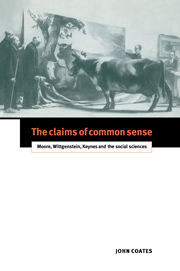The Claims of Common Sense
The Claims of Common Sense investigates the importance for the social sciences of the ideas developed in Cambridge philosophy between the two World Wars. John Coates examines the thought of Moore, Ramsey, Wittgenstein and Keynes, and offers new evidence that there was a far closer collaboration among them than has hitherto been supposed. He then proposes that Wittgenstein's and Keynes's ideas on the economy of ordinary language present a way of bridging the current gap between the philosophy and practice of social science.
- Looks at the development of Keynes with biographical information
- Account of key period in development of twentieth-century philosophy
- Broad readership in social science as well as philosophy: book is exceptionally clearly written, and author started life as an economist
Reviews & endorsements
"John Coates's The Claims of Common Sense: Moore, Wittgenstein, Keynes and the social sciences is a very ambitious book." David R. Amdrews, Review of Social Economy
Product details
August 2007Paperback
9780521039581
196 pages
226 × 152 × 10 mm
0.302kg
Available
Table of Contents
- Preface
- Introduction
- 1. A short history of common sense
- 2. Ideal languages and vague concepts: the transition in Cambridge philosophy
- 3. Keynes and Moore's common sense
- 4. Keynes's later views on vagueness and definition
- 5. Samples, generalizations and ideal types
- 6. The Cambridge philosophical community
- Conclusion: complexity, vagueness and rhetoric
- Index.








